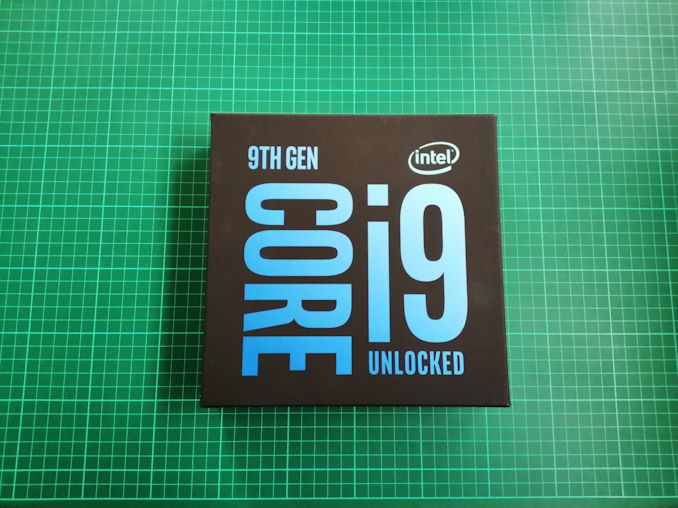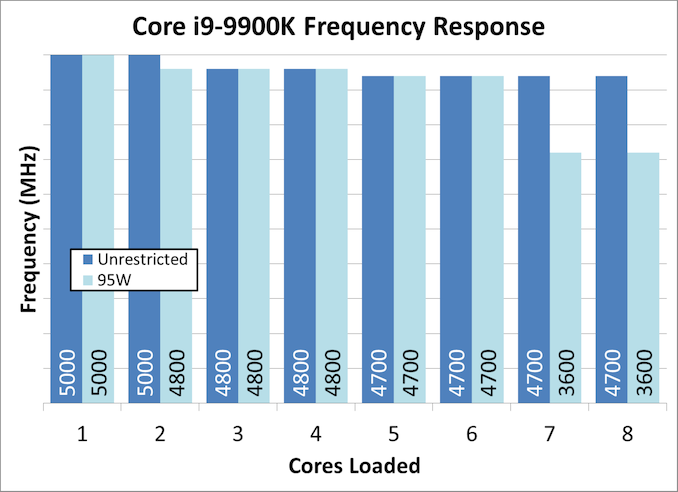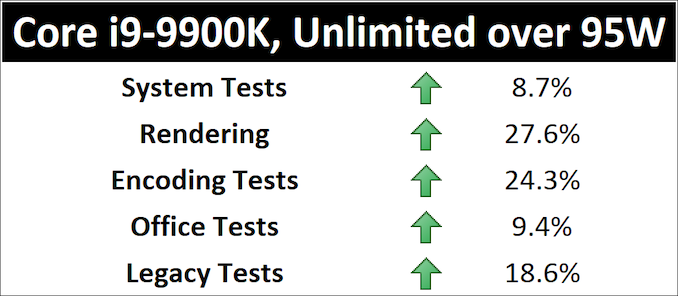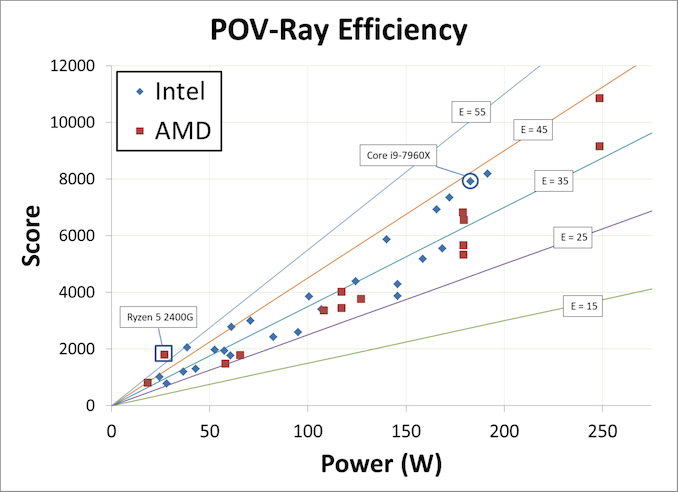The Intel Core i9-9900K at 95W: Fixing The Power for SFF
by Ian Cutress on November 29, 2018 8:00 AM ESTCore i9-9900K in Small Form Factors
Even with all the hullabaloo surrounding how Intel defines TDP and what values the company should actually be advertising for the power consumption of its processors, the simple fact is that processors generate thermal energy when they run. Sometimes it’s a small amount, and sometimes it’s a lot, but in every case that thermal energy has to be managed, either by the box cooler, some super extreme water chiller loop, or by a super massive fanless heatsink. In order to maintain performance, the thermal solution also has to be suitable for the environment at hand.
Nothing proves more channeling than designing a system for something small, and still maintaining high levels of performance. There are tradeoffs – performance for noise, or silence for performance. One way to manage this is through configuring the turbo and power values of the system in the firmware, and it is this method that OEMs use for laptops and mini-PCs.
Some Performance Loss, But More Efficient
The performance that Intel guarantees is the one on the box: the base frequency at the sustained TDP. For system integrators or builders, this gives a simple comparison point, and when we set our power consumption limits for the Core i9-9900K, this is what we saw at full load: 95W gave 3.6 GHz at 7-8 core load.
Losing almost half the power from standard operation caused the frequency to drop by 23% at the fast and furious end, which has a knock-on effect on performance. As was perhaps to be expected, for our throughput benchmarks, it was sizeable. For this data, we’re going to represent the performance uplift from 95W to the ‘unlimited power’ mode:
The system and office tests, which are a mix of latency and throughput tests, saw just under a 10% gain going from 95W to unlimited mode. For pure throughput however, that 23-24% difference in frequency gave an equivalent gain to the unlimited power mode. The only flipside is power: the extra performance pushes power consumption to 164-165W, which is a 74% power gain. If we were going for performance per watt, then the 95W wins that battle very easily. It all depends if the form factor the processor is in can provide sufficient cooling.
Doing these numbers gave me an idea for a metric for power efficiency. We currently run our power tests during a run of POV-Ray, and as a result, we can plot the power consumption during our POV-Ray test against the POV-Ray result score.
The highest performers are at the low end of the spectrum of what we’ve tested, with the Ryzen 5 2400G and Core i5-8305G (Kaby Lake-G) being the top performers, getting an efficiency rating (score/power) of 67 and 53 respectively. However Intel’s Skylake-X parts and the Threadripper 2990WX all scored highly on this metric too, around the 43 mark. This is likely because these high-power processors actually give less power per core, and each core is nearer to its peak efficiency for frequency/voltage.
The Intel Core i9-9900K, in normal operation, scores an efficiency rating of 32.9. This rises to 44.2 if the processor is fixed to 95W. This ultimately puts the 9900K in the limelight for an SFF system: when the power is limited to 95W, you get all the single core performance, most of the variable threaded performance, and around a 10-27% loss in throughput testing, most noticably in rendering. Overall, it acts like a 9900K in single thread mode, and like a 9700K in multi-thread mode.














101 Comments
View All Comments
urbanman2004 - Thursday, November 29, 2018 - link
Yeah, the 9900K is the latest and greatest when it comes to mainstream CPU's, but at its current pricing you're better off purchasing a more value oriented CPU such as the 8700K to get more bang for your buck. Intel has been losing their sh!t as of late ever since AMD's Ryzen has them on their heels.AlyxSharkBite - Thursday, November 29, 2018 - link
The 9900K is awesome if you build a rig that can keep it cool when overclocked. But otherwise yeah an 8700K is a better choice or for bang for buck the 2700X is good4800z - Thursday, November 29, 2018 - link
It's not that hard to cool it. Just need a big noctua or an AIO.TheinsanegamerN - Thursday, November 29, 2018 - link
It still runs high 90C under OC on such coolers. The only way to keep it running at a 5 GHz OC with with a 360mm rad, and even then just barely.The 9900k is the hardest intel to cool since the pentium DEE
4800z - Thursday, November 29, 2018 - link
If you want value stop playing games and get a part time job so you can have more money in your pocket. The 9900k is only a few hundred dollars more. THat's not much spread over years.sa666666 - Thursday, November 29, 2018 - link
Found the Intel shill/apologist. Not everyone has unlimited funds to spend like that, and even if they could afford the CPU, what about the power to run it? This CPU is very power-hungry and expensive, and insulting users that don't have a lot of money (or have a better sense of how to properly budget it) won't change that fact.schujj07 - Thursday, November 29, 2018 - link
Very true. Has to justify the reason for spending an arm and a leg on his/her new space heater. 4800z while the CPU is $200 more expensive, you also need the $70+ cooler, you have to have the expensive z390 motherboard that adds another $70 onto the build, your room is going to be warmer so that will increase your cooling costs, and drawing 77% more power means you are going to increase your electric bill. All these costs add up and unless you are able to purchase this on a credit card with 0% interest or have saved up for a long time, the extra $400 is going to make a huge difference. Also someone could go with the 2700X or 8700K and use the extra $400 for a nice upgrade on their build, where said person would have gotten a RTX2080 not s/he can afford a RTX2080Ti.TEAMSWITCHER - Thursday, November 29, 2018 - link
He's not wrong. The 9900K is closer the Thread Ripper in many benchmarks than Ryzen is to the 9900K, and at the same time closer to Ryzen in cost. While billed as a gaming processor, the 9900K is great for content creators. Unless you have a specific need for HEDT platform capabilities (RAM or PCIe lanes) the 9900k would get the job done for less money.Targon - Thursday, November 29, 2018 - link
And if you just wait until March of 2019, Ryzen 3rd generation will probably meet or beat the performance of the 9900k for $330. So your $200+ higher price will only be for 4-5 months of having superior performance before the new AMD will be considered faster.HollyDOL - Saturday, December 1, 2018 - link
I know a person holding to a similar philosophy. He still runs Athlon XP, always waiting for the next generation beating the current one.